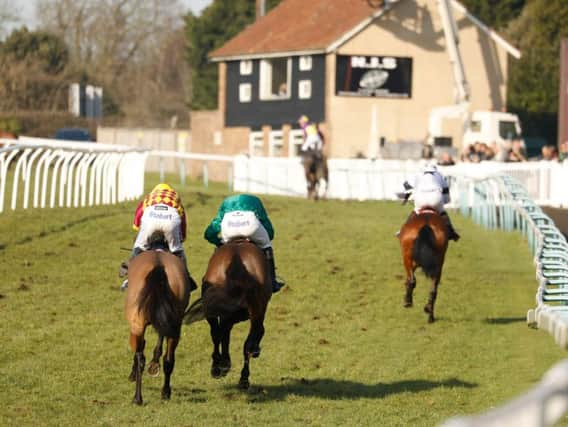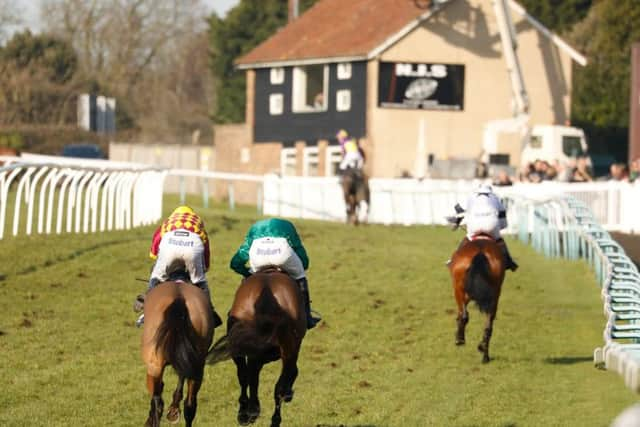The millions of pounds lost during horse racing's shutdown for equine flu


Based on an average daily levy yield of £250,000, the sport's lost levy income would have been in the region of £1.5m. The Levy Board has also agreed to provide £340,500 of funding towards rescheduled or additional races, while the Equine Infectious Diseases Service Fund, which is financed by the Levy Board, the Thoroughbred Breeders' Association and owners, will meet the costs of AHT testing, expected to be around £100,000.
All the above produce a Levy Board-linked total of £1,940,500, but from that must be subtracted £746,000 the body did not have to pay in prize-money over the missing six days. That takes us down to £1,194,500.
Advertisement
Hide AdAdvertisement
Hide AdFor more on the aftermath of the equine flu outbreak and racing shutdown see the Racing Post websiteThe Professional Jockeys Association estimates jockeys were denied £228,000, agents £29,000 and valets £22,000. Owners are likely to be £189,000 poorer through their own swab testing costs, while they additionally missed out on chances to win prize-money. That makes their own financial position difficult to gauge, with the same applying to trainers.


Also important to note is some of the sums outlined in these calculations flow around the sport. For example, a significant chunk of the money jockeys failed to receive would have come from owners.
Even harder hit were racecourses. No less than 13 of the cancelled meetings were due to be staged at Arena Racing Company tracks. Based on losses incurred from the likes of media rights, streaming, international sales, racecourse betting shops, attendances, hospitality and deep cleans, the company believes it forfeited between £1.5m and £2m.
Racecourse Media Group, which connects all the other venues that were forced to keep gates closed, has arrived at a figure broadly in line with Arc's given fewer fixtures disappeared.
Advertisement
Hide AdAdvertisement
Hide AdFinance director Martin Stevenson says: "From the perspective of our racecourses there was probably £1m to £1.5m of RMG media earnings lost as a result of the shutdown.
"It's very simple. When we stop providing product to our customers those customers stop paying. That applies to traditional bookmakers, online bookmakers, streaming and international sales. It's a very direct and linear relationship.
"This is real and you cannot brush it under the carpet. I would have thought it comes to multiple millions across the industry."
Stevenson adds: "At this time of year all-weather racing is important for the industry, but even that closed down. In a period of bad weather that would not have been the case. Stopping completely for an unknown period of time is very difficult and very different compared to losing a few fixtures over the course of a few days.
Advertisement
Hide AdAdvertisement
Hide Ad"However, the decision to stop racing was presumably taken mindful of stopping something worse happening. We are not a million miles off Cheltenham, which is massively important to the industry."
In relative terms, the economic pain sustained by Cheltenham's owners, Jockey Club Racecourses, was "neither here nor there" according to chief executive Paul Fisher, primarily because the lost cards were not hugely profitable.
Even so, he says: "If it had carried on for any longer there would have been some serious financial consequences. We would have been looking at a significant loss every week that would have been in the hundreds of thousands of pounds. Like any business, if you don't have money coming in you have an overhead burn.
"While I've been involved with the business we had foot and mouth in 2001 and then we lost the Wednesday of the Cheltenham Festival because of high winds in 2008. Given the risk involved and how financially important they are to us, we have insurance policies on both the Cheltenham and Aintree festivals. Unfortunately, as we all know, once you make a claim the premium goes through the roof."
Advertisement
Hide AdAdvertisement
Hide AdFisher adds: "We have obviously been keen to get back racing as quickly as possible because as racecourses our role is to get prize-money flushing through the system. Otherwise everybody starts to hurt."
Bookmakers will also have been hurt – but it is hard to state by how much, not least because gambling companies are notoriously reluctant to divulge numbers.
Drawing some conclusions, Gavin Kelleher, an equity analyst at Goodbody Stockbrokers, says: "Based on a lost levy forecast of £1.5m, which seems reasonable based on annual totals, bookmakers would have forfeited £15m through the shutdown.
"However, the period of time was short, there was a full calendar of Irish racing and there is a decent chance lost racing revenue was redirected into that and other sport products. Overall, therefore, there was probably a good level of mitigation."
On this basis, it seems reasonable to assume a total cost to the bookmaking industry of £10 million.